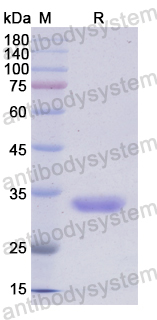Catalog No.
YHA11801
Expression system
E. coli
Species
Homo sapiens (Human)
Protein length
Met1-Pro263
Predicted molecular weight
32.36 kDa
Nature
Recombinant
Endotoxin level
Please contact with the lab for this information.
Purity
>90% as determined by SDS-PAGE.
Accession
O00444
Applications
ELISA, Immunogen, SDS-PAGE, WB, Bioactivity testing in progress
Form
Lyophilized
Storage buffer
Lyophilized from a solution in PBS pH 7.4, 0.02% NLS, 1mM EDTA, 4% Trehalose, 1% Mannitol.
Reconstitution
Reconstitute in sterile water for a stock solution. A copy of datasheet will be provided with the products, please refer to it for details.
Shipping
In general, proteins are provided as lyophilized powder/frozen liquid. They are shipped out with dry ice/blue ice unless customers require otherwise.
Stability and Storage
Use a manual defrost freezer and avoid repeated freeze thaw cycles. Store at 2 to 8°C for frequent use. Store at -20 to -80°C for twelve months from the date of receipt.
Alternative Names
PLK-4, Serine/threonine-protein kinase Sak, Serine/threonine-protein kinase PLK4, STK18, PLK4, Polo-like kinase 4, Serine/threonine-protein kinase 18, SAK
Role of PLK4 inhibition in cancer therapy., PMID:40512236
Investigating the Mechanisms of Pazopanib-induced Hepatotoxicity: Insights from Network Toxicology, Microarray Analysis, and Machine Learning., PMID:40417760
Discovery of RP-1664: A First-in-Class Orally Bioavailable, Selective PLK4 Inhibitor., PMID:40378279
Binding of CEP152 to PLK4 stimulates kinase activity to promote centriole assembly., PMID:40372713
M phase-specific generation of supernumerary centrioles in cancer cells., PMID:40266756
PLK4 Homodimerization is Required for CEP152 Centrosome Localization and Spindle Organization., PMID:40222413
Author Correction: Drosophila Alms1 proteins regulate centriolar cartwheel assembly by enabling Plk4-Ana2 amplification loop., PMID:40102689
Pericentriolar material 1 aggregation maintains cell survival upon prolonged replication stress., PMID:40090437
Drosophila Alms1 proteins regulate centriolar cartwheel assembly by enabling Plk4-Ana2 amplification loop., PMID:40021845
JNK Inhibition Overcomes Resistance of Metastatic Tetraploid Cancer Cells to Irradiation-Induced Apoptosis., PMID:39940976
Interactions of N- and C-terminal parts of Ana1 permitting centriole duplication but not elongation., PMID:39904373
Polo-like kinase 4 accelerates glioma malignant progression and vasculogenic mimicry by phosphorylating EphA2., PMID:39694224
A Method for Analyzing Acentrosomal Mitotic Spindles in Human Cells., PMID:39616579
Centrioles are frequently amplified in early B cell development but dispensable for humoral immunity., PMID:39406735
Novel insights into the circadian modulation of lipid metabolism in chicken livers revealed by RNA sequencing and weighted gene co-expression network analysis., PMID:39361997
KIFC1 depends on TRIM37-mediated ubiquitination of PLK4 to promote centrosome amplification in endometrial cancer., PMID:39349439
Plk4 regulates centriole duplication in the embryonic development of zebrafish., PMID:39304174
Key role of CYP17A1 in Leydig cell function and testicular development in Qianbei Ma goats., PMID:39278335
NL13, a novel curcumin analogue and polo like kinase 4 inhibitor, induces cell cycle arrest and apoptosis in prostate cancer models., PMID:39142876
The Unkempt RNA binding protein reveals a local translation program in centriole overduplication., PMID:39131325
Assessment of Recovery Time Effects on Human Primary Neonatal Dermal Fibroblasts After Exposure to Solar-Simulated Ultraviolet Radiation., PMID:39050996
Progress with polo-like kinase (PLK) inhibitors: a patent review (2018-present)., PMID:38994687
Kinase activity of histone chaperone APLF maintains steady state of centrosomes in mouse embryonic stem cells., PMID:38968704
CRISPR screens reveal convergent targeting strategies against evolutionarily distinct chemoresistance in cancer., PMID:38951519
Spermatocytes have the capacity to segregate chromosomes despite centriole duplication failure., PMID:38943004
Inhibition of Aberrantly Overexpressed Polo-like Kinase 4 Is a Potential Effective Treatment for DNA Damage Repair-Deficient Uterine Leiomyosarcoma., PMID:38848043
The kinase ZYG-1 phosphorylates the cartwheel protein SAS-5 to drive centriole assembly in C. elegans., PMID:38744971
The prognostic values and immune characteristics of polo-like kinases (PLKs) family: A pan-cancer multi-omics analysis., PMID:38560150
Systematic molecular analyses for 115 karyotypically normal men with isolated non-obstructive azoospermia., PMID:38511217
CRL4DCAF1 ubiquitin ligase regulates PLK4 protein levels to prevent premature centriole duplication., PMID:38490717
Centrosome amplification and aneuploidy driven by the HIV-1-induced Vpr•VprBP•Plk4 complex in CD4+ T cells., PMID:38443376
PLK4 reflects extrathyroidal invasion, high tumor stage and poor prognosis in papillary thyroid carcinoma patients., PMID:38440866
Mouse SAS-6 is required for centriole formation in embryos and integrity in embryonic stem cells., PMID:38407237
Prolonged overexpression of PLK4 leads to formation of centriole rosette clusters that are connected via canonical centrosome linker proteins., PMID:38388511
PLK4 as a potential target to enhance radiosensitivity in triple-negative breast cancer., PMID:38365710
FOXM1 Participates in Trophoblast Migration and Early Trophoblast Invasion: Potential Role in Blastocyst Implantation., PMID:38338955
Tumor polo-like kinase 4 protein expression reflects lymphovascular invasion, higher Federation of Gynecology and Obstetrics stage, and shortened survival in endometrial cancer patients who undergo surgical resection., PMID:38326803
β-catenin mediates growth defects induced by centrosome loss in a subset of APC mutant colorectal cancer independently of p53., PMID:38324534
Explore Key Genes and Mechanisms Involved in Colon Cancer Progression Based on Bioinformatics Analysis., PMID:38294732
Polo-like kinase 4 promotes tumorigenesis and glucose metabolism in glioma by activating AKT1 signaling., PMID:38290657
Seize the engine: Emerging cell cycle targets in breast cancer., PMID:38264947
Therapeutic potential of targeting polo-like kinase 4., PMID:38199166
Cadmium promotes the binding and centrosomal translocation of CCDC85C and PLK4 via ROS-GCLM pathway to trigger centrosome amplification in colon cancer cells., PMID:38185225
Preclinical characterization and clinical trial of CFI-400945, a polo-like kinase 4 inhibitor, in patients with relapsed/refractory acute myeloid leukemia and higher-risk myelodysplastic neoplasms., PMID:38114624
PLK4, a potential target against AML., PMID:38060272
A simple Turing reaction-diffusion model explains how PLK4 breaks symmetry during centriole duplication and assembly., PMID:37983248
Polo-Like Kinase 4 Correlates with Aggressive Tumor Characteristics, Shortened Disease-Free Survival and Overall Survival in Patients with Cutaneous Melanoma who Undergo Surgical Resection., PMID:37940564
NAMPT mediates PDGF-induced pulmonary arterial smooth muscle cell proliferation by TLR4/NF-κB/PLK4 signaling pathway., PMID:37914064
Advanced glycation end products initiate the mutual promoting cycle between centrosome amplification and the release of inflammatory cytokines in human vascular endothelial cells., PMID:37788590
PLK4 self-phosphorylation drives the selection of a single site for procentriole assembly., PMID:37773039

